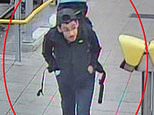Manchester bomber’s mosque says it’s suffered ‘smearing and demonisation’
Manchester bomber’s mosque says it has suffered ‘smearing and demonisation’ at claims it turned ‘blind eye’ to terrorism and criticises ‘misleading comments’ by victims’ barrister
Calls have been made for Didbury Mosque’s charity status to be reviewed by regulators after it came under criticism following the Manchester Arena inquiryTheir statement said they’ve suffered ‘smearing and demonisation’ after claimsThe mosque was attended by Manchester Arena suicide bomber Salman Abedi
<!–
<!–
<!–<!–
<!–
(function (src, d, tag){
var s = d.createElement(tag), prev = d.getElementsByTagName(tag)[0];
s.src = src;
prev.parentNode.insertBefore(s, prev);
}(“https://www.dailymail.co.uk/static/gunther/1.17.0/async_bundle- -.js”, document, “script”));
<!–
DM.loadCSS(“https://www.dailymail.co.uk/static/gunther/gunther-2159/video_bundle- -.css”);
<!–
A mosque attended by Manchester Arena suicide bomber Salman Abedi and his family says it has suffered ‘smearing and demonisation’ after claims it turned a ‘blind eye’ to extremism.
Didsbury Mosque in south Manchester came under severe criticism at the Manchester Arena public inquiry into the terror attack, with calls for its status as a charity to be ‘reviewed’ by regulators.
Earlier this month lawyers for the families of the bereaved said it was accepted the mosque was in no way linked to the bombing or the radicalisation of Salman Abedi, who carried out the deadly bomb attack after an Ariana Grande concert on 22 May 2017.
But it was claimed the mosque had hosted extreme Islamist sermons, failed to condemn violence and ‘buried its head in the sand’ over radicals in its congregation.
Didsbury Mosque in south Manchester, which was attended by Manchester Arena suicide bomber Salman Abedi, pictured making his way to the Ariana Grande concert venue, and his family, says it has suffered ‘smearing and demonisation’ after claims it turned a ‘blind eye’ to extremism
In a statement on the mosque’s Facebook page on Tuesday, the mosque cited ‘misleading comments’ by John Cooper QC, representing some of the families of the 22 murdered in the bombing, and Detective Chief Superintendent Dominic Scally, head of Counter Terrorism Policing North West (CTPNW).
Mr Cooper QC, suggested mosque elders down-played any issues and were more concerned with protecting the mosque’s reputation than putting things right.
There was an attempt to associate Didsbury Mosque with extremism and radicalisation and a ‘diversion’ tactic to prevent focus on the failure of police and the security services to prevent the attack, the statement said.
It continued: ‘Whilst it is stated that Didsbury Mosque did not support violence or have anything to do with the attacks, their subsequent comments still attempt to associate Didsbury Mosque with extremism and radicalisation.
‘We believe this is a diversion from focusing on the very real failings of those agencies with a duty to protect the public and prevent such attacks.
‘It is disingenuous to try to give the impression Didsbury Mosque has not condemned the Manchester Arena attack, and bizarre that the Charity Commission should be asked to revoke our charitable status on that basis.
‘We made it clear that this barbaric act had nothing to do with Didsbury Mosque, Islam, or the Quran, immediately after the attack.
‘Mr. Wilkinson, (the Inquiry’s radicalisation expert) has already concluded that Didsbury Mosque has not played any role in the radicalisation of Salman Abedi and that he was radicalised in Libya’s civil war.
‘We, therefore wonder what the purpose of continuous speculation about Didsbury Mosque in the context of the failure to prevent an attack, serves.’
Salman Abedi attended the mosque along with his brother Hashem, who was jailed for life for the bomb plot, as well his older brother Ismail and their parents.
An Imam at the mosque, Mohammed El-Saeiti, who delivered a sermon condemning terror groups, told the inquiry trustees believed speaking up against terrorists would ‘provoke’ its sympathisers and supporters.
The mosque then failed to support him when he faced a petition for his removal signed by, among others, Ramadan Abedi, father of the bomber.
He said after the bombing the mosque’s solicitor, a Mr Hafezi, pressured him to not mention the Abedis’ links to the mosque.
Didsbury Mosque in south Manchester (pictured) came under severe criticism at the Manchester Arena public inquiry into the terror attack, with calls for its status as a charity to be ‘reviewed’ by regulators. Earlier this month lawyers for the families of the bereaved said it was accepted the mosque was in no way linked to the bombing or the radicalisation of Salman Abedi, who carried out the deadly bomb attack on 22 May 2017
But UK foreign policy in Libya ‘which encouraged some Manchester Libyans to go and fight’ had, according to the mosque’s statement, created extremism among some groups in the city.
The statement said it had tried to keep politics out of the mosque, adding: ‘Mosques are places of worship and should not become places where intelligence gathering on people’s lives and politics should take place.’
And the mosque’s statement also said it had condemned the Manchester Arena bombing ‘in front of the world’s media,’ and made it clear the attack had nothing to do with Didsbury Mosque, Islam, or the Quran.
Didsbury Mosque suffered an arson attack last year and the mosque said recent threats on social media to bomb the mosque had been reported to police.
Two final reports on the background to the Arena bombing will be issued by the public inquiry later this year.
![]()


